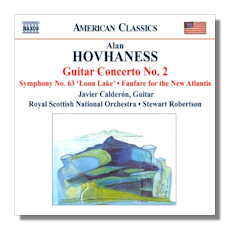
The Internet's Premier Classical Music Source
Related Links
- Hovhaness Reviews
- Latest Reviews
- More Reviews
-
By Composer
-
Collections
DVD & Blu-ray
Books
Concert Reviews
Articles/Interviews
Software
Audio
Search Amazon
Recommended Links
Site News
 CD Review
CD Review
Alan Hovhaness

- Fanfare for the New Atlantis, Op. 281
- Concerto #2 for Guitar and Strings, Op. 394
- Symphony #63 "Loon Lake", Op. 411
Javier Calderón, guitar
Royal Scottish National Orchestra/Stewart Robertson
Naxos 8.559336 DDD 59:29
The failure of Alan Hovhaness' music to break into the mainstream puzzles me. If I were a cynic – and sometimes I am – I would suggest that all his legacy really needs is a good publicist. Certainly there's a place for music of this genre, although most of it is not as good as Hovhaness'. Perhaps the problem is that he wrote too much music – look at those opus numbers! – and that has created mistrust. (Writing "too much music" is not something we hold against composers from the Baroque or Classical periods, however.) Or perhaps his music really is too "simple," that is to say, too easily understood. Still, that doesn't seem to have harmed several popular modern composers all that much.
All three of these works have been recorded for the first time with this release. The opening Fanfare represents exactly what the title suggests: the emergence of the lost island of Atlantic from its watery resting place. Composed in 1975, this piece begins with a trumpet playing a melody typical of the composer: long-limbed and hymn-like, with interesting shifts in its implied harmony, sometimes suggesting his Armenian heritage. The scoring is dominated by brass and percussion, who contribute to a very impressive climax as the work progresses.
The Second Guitar Concerto was composed in 1985 for guitarist Narciso Yepes, whose première performance was delayed for five years following the death of his son. The first movement is mysterious, with pizzicato strings frequently used to accompany the soloist's understated melodies. The "turns" in the melody evoke the plucked instruments of the Middle East. The second movement uses similar devices, but is melodically and harmonically warmer. The much longer third movement gives more prominence to the strings, who sing another one of Hovhaness' signature hymns, as the guitar comments softly and reserves most of its thoughts for the cadenza near the end. The last movement gently bewitches with its additive rhythms before coming to a teasingly abrupt ending. Throughout, Calderón plays the solo part with dignity, which seems to be the most necessary emotional quality in this work.
The "Loon Lake" Symphony retains Hovhaness' fingerprints and goes further – specifically, into the realm of fingerpainting, if you will. In other words, this symphony is an extended nature portrait, and as such, sounds less like a symphony than like the soundtrack to an idealized documentary about life in, on, and around the eponymous lake in New Hampshire. Perhaps remembering the composer's use of actual whale song in And God Created Great Whales, the Loon Preservation Society in New Hampshire asked that the song of the loon be included in this symphony, which was commissioned in 1987. This Hovhaness did, also including the song of the hermit thrush, but rather than using actual recordings, Hovhaness used a piccolo. The rest of the orchestra provides the melodic argument, and imitates the movements of the lake, and of the wind that plays upon it. The results are pretty, cosmic, naïve, or heartfelt, depending on one's point of view.
These are assured readings from a first-class orchestra and from a conductor who clearly doesn't feel that he needs to apologize for Hovhaness' music. Bombast is kept at bay, and the music is shaped with gentleness and understanding by Stewart Robertson. Hovhaness is one composer whose music I always plan to hear more than I do, and after hearing this CD, my resolution has been renewed, although it is difficult to know where to start, given this composer's enormous output!
The likeable booklet notes are by Hinako Fujihara Hovhaness – the composer's widow.
Copyright © 2008, Raymond Tuttle




















